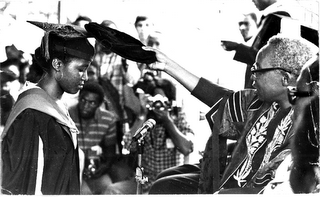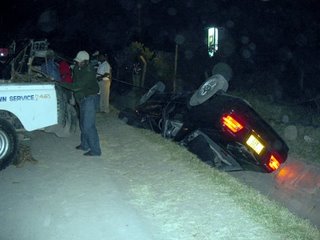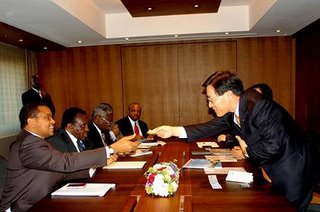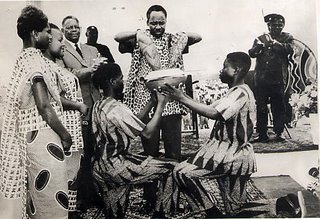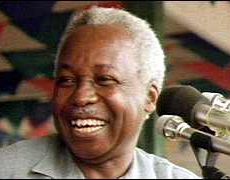 An old respectful Tanzanian lady dropped by for a visit last night. She dropped her hello for my brother who just moved to the US from Tanzania. That was a wonderful courteous Tanzanian gesture. Quite naturally, the conversation touched on politics and “maendeleo” topics. Given that my brother just landed, we all expected a fresh perspective from Bongo. Obviously, when you talk about “maendeleo” you cannot avoid throwing Mwalimu Nyerere into the mix.
An old respectful Tanzanian lady dropped by for a visit last night. She dropped her hello for my brother who just moved to the US from Tanzania. That was a wonderful courteous Tanzanian gesture. Quite naturally, the conversation touched on politics and “maendeleo” topics. Given that my brother just landed, we all expected a fresh perspective from Bongo. Obviously, when you talk about “maendeleo” you cannot avoid throwing Mwalimu Nyerere into the mix.I have had a taste of what it meant to live in the Nyerere era. I understand the mystique around this late dude. This lady happened to be an old guard who strongly believe that Nyerere is the best thing that has ever happened to Tanzania.
Really?
How do we know that Nyerere was the best thing? See the problem I have with folks who regard Nyerere highly is that we don’t the alternatives, at his time, to make a logical, objective comparison. I am not even sure if we know Nyerere for who is or what he wanted Tanzanians to believe. He managed to create an aura of admiration and worship. He created an atmosphere where no one would question his ideas.
Remember the days when we couldn’t read anything other than Uhuru, Mzalendo, Daily News and Sunday News before Mfanyakazi came into existence to provide some kind of an entertainment relief? You remember the days when the 8:00 PM RTD news bulletin would be followed up by a “Ujumbe wa Leo” propaganda? I have to give it up to Nyerere. He ensured that Tanzanians couldn’t run or hide from his ideology. If you feed someone junk for twenty (20) years, they would believe that crap. He even went as far as insulting our intelligence by putting a hoe against himself in the election. A hoe or a hammer, can you believe that? Who elects a hoe as the president?
What ticked me off is the fact that he forced us to sing derogatory songs against Oscar Kambona. We sang this tune during our morning mchakamchaka routines in High School, “Kambona ameolewa! Wapi?! Wapi?! Uingereza!” Was Kambona really that bad? What is the historical truth?
Since I was born past the time Kambona took off, I had to dig into the history materials to find out for myself. This is what I found.
When the TANU National Executive Committee met in Arusha January 26-29 1967 it turned out to be a stormy session. At this meeting Nyerere proposed that Ujamaa become the official policy of the government. Oscar Kambona objected strongly to this policy. Twice during these sessions, the Executive Committee adjourned in order to allow their three leaders, Nyerere, Kambona and Kawawa to go into private session. Each time that they returned to the Executive Committee it was apparent that Kawawa had supported Nyerere to defeat Kambona. The result was that the Arusha Declaration was adopted.
Source: Maryknoll Africa
It gets me mad to realize that I actually sang derogatory songs against an individual who did nothing wrong. If at all, his crime was to express his opinion against Nyerere’s utopian dreams. The worst part is the fact that the introduction of free market economy has proven that Kambona was right and Nyerere's ideas were just a disaster in the making.
I strongly believe that Nyerere was just another dictator. A very intelligent dictator though. The dude didn’t physically kill anyone, so you cannot put him the same pile with the likes of Bokassa or Idd Amin. Nonetheless, he softly killed Tanzanians mentally and intellectually. He killed private, independent thinking. He hypnotized the majority of Tanzanians.
The saddest part if that the majority of Tanzanians are too lazy to question and explore the truth even today. Some have not awakened to the fact that the Nyerere’s legacy could be all inflated, if not manipulated to glorify his persona. Great people don’t lie, and I feel Nyerere lied to me about visionaries like Kambona whom the Tanzanian history has deliberately marginalized.
I am sure there are plenty of folks who would think that I am crazy for questioning Nyerere’s legacy. But am I, really?
